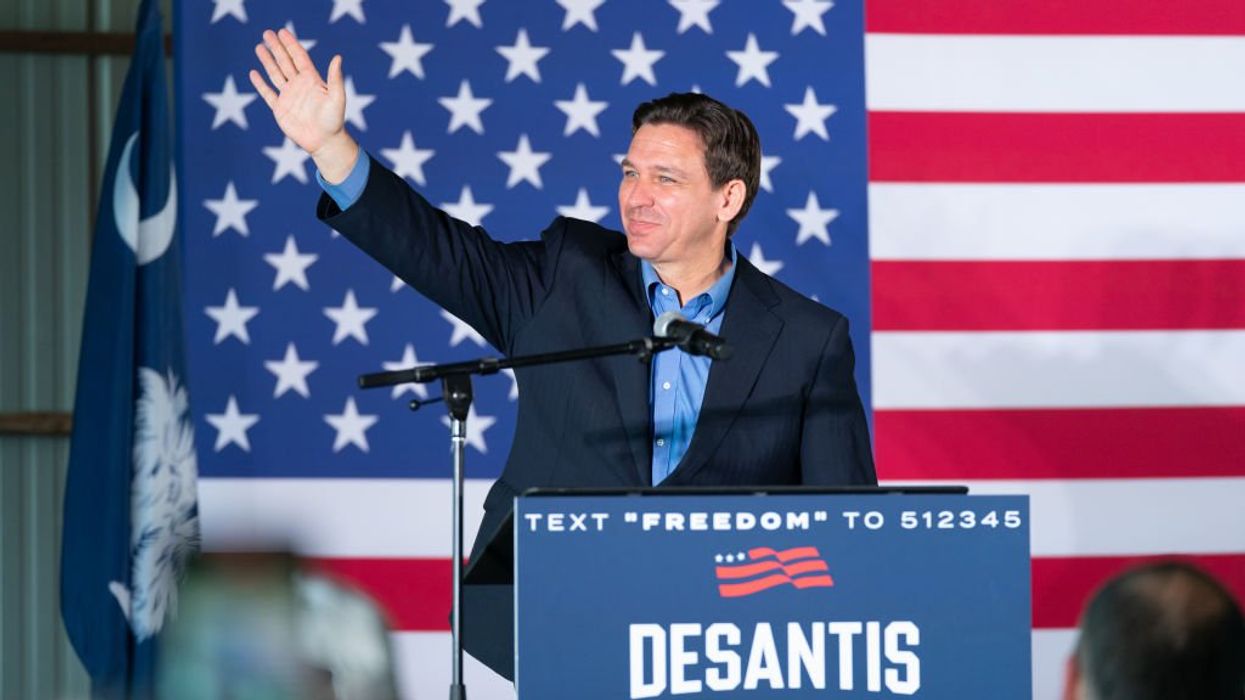
Sean Rayford/Getty Images

Where in the Constitution does it give the federal government the power to get involved in local education issues in the first place? Well, wherever you find that clause in invisible ink, it most certainly would not empower the Department of Education to subject your state-based higher education institutions to accreditation by unelected, carefully selected accrediting organizations. After years of putting up with this unconstitutional power grab, which allows left-wing NGOs to subtly push a particular agenda in exchange for accreditation, Florida Gov. Ron DeSantis is challenging its legal authority.
On Thursday, Gov. DeSantis and Florida Attorney General Ashley Moody announced a federal lawsuit against the Department of Education for its unconstitutional delegation of authority to private accreditation groups that act as gatekeepers for what is considered a legally acceptable university. While this might appear at first glance to be more of a technical question of accreditation authority, it lies at the core of how woke ideology has permeated every major industry and profession.
Increasingly over the years, state and federal governments have elevated professional and trade associations to the status of government gatekeepers. In various ways, they use medical accreditation boards and the American Bar Association, in two of the most important professions, for example, to serve as legal bars to entry for competing ideas. This is how they were able to keep doctors and lawyers from challenging the official narrative on COVID. And by forcing specific accreditation associations down the throats of state universities, the federal government ensures that the indoctrination agenda flows like a poison drip to all 50 states while accompanying the federal subsidies and student loans.
Accordingly, $112 billion in federal education dollars flow based on the accreditation of a selected private monopoly created by government but unaccountable to popular elections. As such, pursuant to federal law, Florida’s universities are forced to bow to the whims of the Southern Association of Colleges and Schools Commission on Colleges to attain legal legitimacy. Recently, SACS, the anointed regional accreditor for the Southeast, threatened the University of North Carolina over its plan to for a program focused on ideological diversity, which is not very common in most colleges.
Sensing that SACS is increasingly going to interfere with his desire to root out cultural Marxism from state universities, DeSantis is suing the DOE on the grounds that the entire concept of regional accreditor gatekeepers runs afoul of the private non-delegation doctrine. This legal doctrine holds that a legislature cannot delegate legal authority to private entities that are not subordinate to a governmental authority.
“You cannot take legislative power and delegate it to an unaccountable private body and let them administer that power without any type of checks and balances, and so we believe it violates what’s called the private non-delegation doctrine, and we think that that we’re going to be right on it,” DeSantis said.
In 2008, Congress essentially made these accreditors a fourth branch of government in the mold of the Federal Reserve, the CFPB, and similar agencies by prohibiting the Department from “promulgat[ing] any regulation with respect to the standards of an accreditation agency” or creating “standards that accrediting agencies or associations shall use to assess any institution’s success with respect to student achievement.” It was part of the officious Higher Education Opportunity Act reauthorization promoted by President Bush.
Fundamentally, having private entities serve as gatekeepers for approval violates the Appointments Clause, according to the governor. Under Article II, Section 2, Clause 2 of the Constitution, any official wielding significant authority under law, such as approval for all education funds, should be subject to approval by the Senate.
DeSantis believes that the DOE should be forced to recognize the legitimacy of a state university based on laws passed by the state legislature. In the case of Florida, the governor signed a law (SB 7044) last year requiring over half of Florida’s public universities to change accreditors in the next two years to other regional organizations so that SACS does not wield monopolistic control. Clearly, he believes that in essence Florida should even be able to create its own accreditation scheme, and so long as the state recognizes it, the feds should too.
In July 2022, the Department of Education sent a letter to regional accreditors warning them that Florida’s law violates the “accepted norm” and “undermines the voluntary nature of the relationship and the independent roles of the various actors in the triad [relationship between accreditors, states, and the DOE].” The department offered new guidance seeking to deter accreditors from playing ball with Florida in order to lock schools into permanent accreditation by SACS.
The lawsuit was filed in the Ft. Lauderdale division of the U.S. District Court for the Southern District of Florida. Obviously, its outcome will be potentially far-reaching beyond Florida’s borders because its success would have the effect of freeing states from this monopoly of accreditation. That will in turn remove another barrier to cleaning up the curriculum in red-state institutions of higher education.
In one respect, DeSantis is coming full-circle from his congressional days when he pushed for state flexibility in accreditation. In 2015, he introduced legislation together with Sen. Mike Lee to allow states to develop their own accreditation systems, not just for four-year universities but also for apprenticeships, job-training programs, and even individual courses, in order to even the playing field with the higher education cartel.
Perhaps, after chasing the private actors working at the behest of the feds out of education, we can eventually uproot the feds from our local education decisions altogether.Daniel Horowitz
Blaze Podcast Host